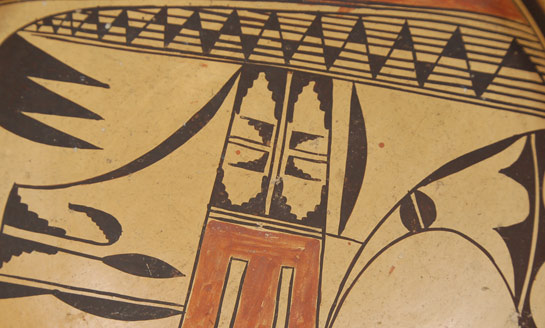Hopi Polychrome Bowl by Nampeyo, circa 1910-1920 [SOLD]
+ Add to my watchlist Forward to Friend
- Category: Historic
- Origin: Hopi Pueblo, Hopituh Shi-nu-mu
- Medium: clay, pigment
- Size: 3-1/8” deep x 11” diameter
- Item # 25618 SOLD
This large open bowl is attributed to the great Hopi potter, Nampeyo of Hano, based on similarities to many documented works of hers. The following quotation is from a Letter of Attribution which accompanies the purchase of the bowl:
"The molding is classic Nampeyo: the rim has the characteristic extra coil, the bottom is perfectly rounded, not flattened, and shows the long stroke marks indicative of Nampeyo's polishing. Overall, the bowl exhibits the solid symmetrical shape and mature molding that we associate with Nampeyo, and for which there are many documented examples. The clay paste also shows small flakes of mica commonly seen in Nampeyo's pottery.
"The painted design is classic Nampeyo, and in fact, there is a similar bowl also by Nampeyo in the permanent collection of the Milwaukee Public Museum that is the match to this bowl. Both bowls show the classic heavy black double framing lines around the elaborate abstracted bird design in the center. Under a polished red sky band, the spirit bird dangles its beauty to please the Hopi deities. At the top of the design, we see the classic triangular accordion shapes of the kachina's lightening frame ending in a large bird's wing, a frequent Nampeyo design element. Beneath, we see the bird's body with its interior nicely abstracted, while three tail feathers complete the vertical design. To the sides, elaborate feathers are presented. Interestingly, the classic swirl design that Nampeyo originally borrowed from the prehistoric Sikyatki potters and which dominated much of her early work is here reduced almost to an afterthought and used only as a small portion of her design on the right side of the bird. But it is this shift of focus that dates this piece to Nampeyo's mature period, from 1910 to 1920, when she has integrated the great Sikyatki designs into her work and is producing fluid masterful painting from her own genius, surpassing her original models." Steve Elmore Indian Art
Condition: good condition with no repair or restoration but with expected amount of wear
Provenance: previously from an estate in Oregon, now from a gentleman in Connecticut.
Recommended Reading: Canvas of Clay: Seven Centuries of Hopi Ceramic Art by Edwin L. Wade and Allan Cooke

- Category: Historic
- Origin: Hopi Pueblo, Hopituh Shi-nu-mu
- Medium: clay, pigment
- Size: 3-1/8” deep x 11” diameter
- Item # 25618 SOLD



